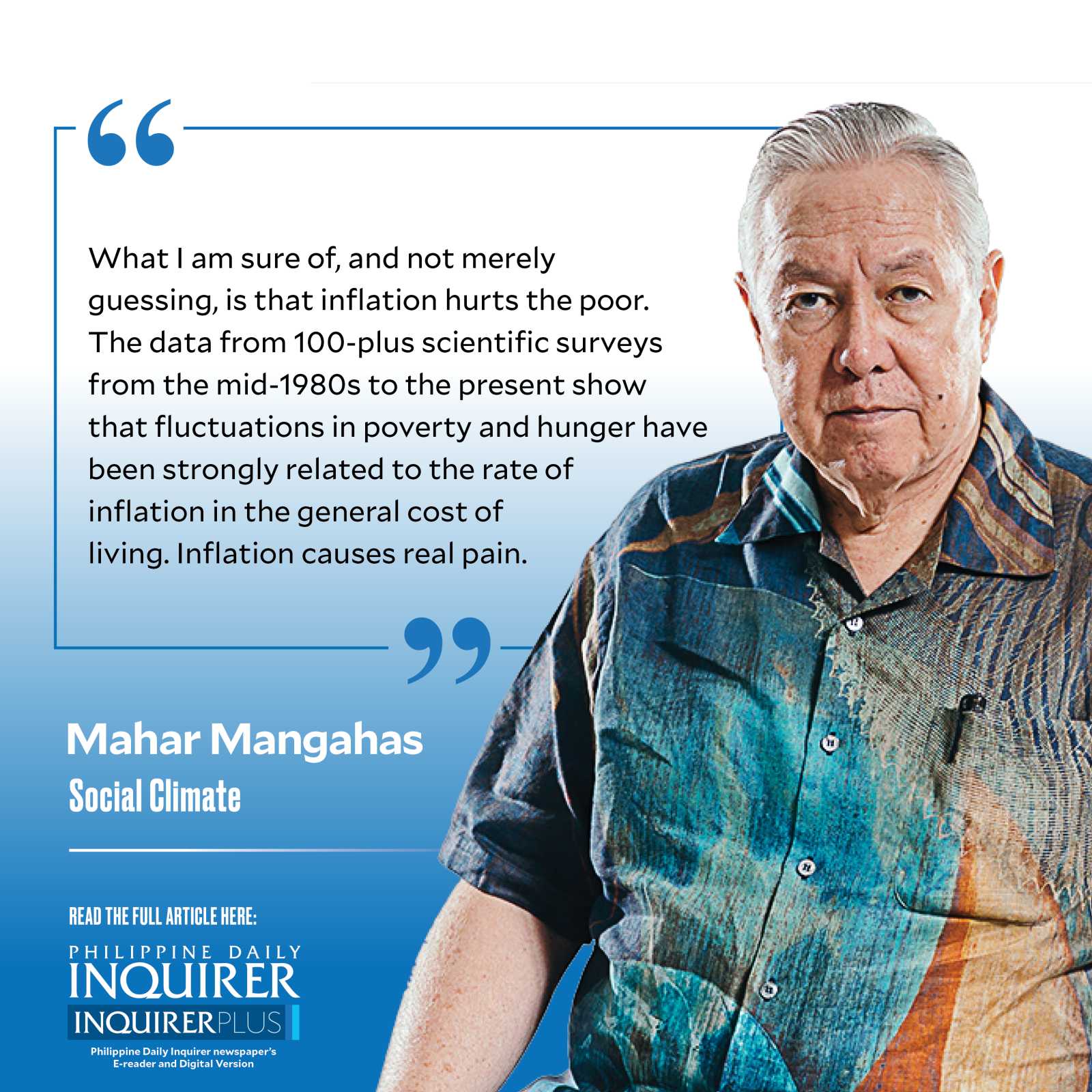Inflation doesn’t hurt the rich

The title here is an educated guess since studying the rich isn’t my field of research. For those interested in statistics about the rich, I suggest Forbes magazine as a starting place—not from reading Forbes, but from learning about its reports every so often in the general news media.
What I am sure of, and not merely guessing, is that inflation hurts the poor. The data from 100-plus scientific surveys from the mid-1980s to the present show that fluctuations in poverty and hunger have been strongly related to the rate of inflation in the general cost of living. Inflation causes real pain.
General economic growth, as measured by the gross national product (GNP), over the long term has been well above growth in the population. And yet poverty has fallen only slightly from 40 years ago, while hunger has not at all been reduced from 35 years ago. Progress in GNP goes unnoticed.
Inflation is the increase in the general cost of living, not in the price of one item like rice, or even in the prices of a group of items like food. Such prices depend on the relative supplies and demands of those specific items; that’s market economics.
Inflation is the cost of keeping money in your pocket. Money is in government jurisdiction. The responsibility for controlling inflation in a given country lies with its own government.
Why doesn’t a government simply print new money to pay the salaries of its employees and to buy whatever it needs to do its jobs? Because that would cause inflation and hurt everyone. It would be a scam, and backfire on the government.
I’m ancient enough to remember, in the 1950s, playing with left-over Japanese occupation notes, each marked “1,000 pesos,” or “Mickey Mouse” money. Those printed notes caused superinflation when a basket of money would buy less than a basket of food at the market.
The current inflation of between 4 and 6 percent, though painful, is comparatively mild. My data on inflation start from 1960. In 1960-1969, the inflation rate per annum was always single-digit, and half the time it was below 5 percent. Recall that Ferdinand Marcos was reelected president in November 1969.
In 1970-1974, inflation was double-digit four times, the exception being 8 percent in 1972; it peaked at 34 percent in 1974. In 1975-1978, it was single-digit again, but from 1979 went double-digit up to the end of Marcos’ regime. There was hyperinflation of 50 percent in 1984, immediately followed by 23 percent in 1985. These were surely part of the fuel behind Edsa People Power Revolution in 1986!
Then inflation eased to 1 percent in 1986, and 4 percent in 1987; but it returned to double-digit in 1988-1991, and again in 1994. It has now been single-digit ever since 1995. I remember Gabriel “Gabby” Singson (Bangko Sentral governor, 1993-1999) saying, not to worry, as long as inflation is single-digit.
For me, however, 5 percent is already critical. In golfing language, five is the highest par score for even the longest hole; the aim of a professional golfer is to break par. It seemed to me that Gabby, an avid golfer like his boss Fidel Ramos, was setting a too-easy-nine as a target for himself.
What the poor need is for their incomes to float with inflation. It is those with fixed incomes, like purely salaried employees, who suffer the most. Even if inflation is only 5 percent, two years without a salary adjustment is a painful 10-percent drop in real income.
I favor the indexation of wages to inflation. I don’t believe blusters about “wage-price spiraling” from those who can’t show data on wages over time. Indexation should start with the government itself, as an example for others.
In fact, when government economic planners state their inflation target as 4-6 percent, are they not implicitly telling government employees to expect their real incomes to fall by 4-6 percent? Have they no coping plan for their colleagues in government? With no plan to maintain real compensation rates, how can they expect maintenance in the quality of government services? Think of the workers in public education, health, and science, who have jobs that serve the poor.
There should also be a plan for regular adjustment of the pay scales of elected officials, of both the national government and the local governments. This would soften the instinct for pork barrel and confidential funds!
The standard coping procedure for people in private businesses, large, small, or micro, is to adjust their selling prices to inflation. “Shrinkflation” is one option. The process should include adjustment of the wages and salaries of their own employees. Profit-sharing should be normal. How about contests among companies and sectors about how well they treat their employees?
But the rich are safe, with their money protected in interest-bearing deposits. The rich are well aware that real interest equals money interest minus the rate of inflation. The banks that cater to them constantly compete with each other to give them good deals. But where are the banks that cater to the poor?
—————
Contact: mahar.mangahas@sws.org.ph.
















